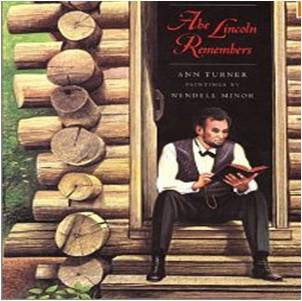Abe Lincoln Remembers

Ann Warren Turner / Grades 1-2 /
What makes greatness possible? For Abraham Lincoln, it was intelligence,
kindness, humor, and courage. He was a boy who'd give anything for a book.
He was a flatboat worker, a wrestler, a postmaster, a lawyer who learned to
lead people with words. And finally he was a President whose words, alas,
could not keep his country together. Simple poetic language and magnificent
paintings by Wendell Minor let readers imagine what might have passed through
the mind and heart of a great leader, from his childhood in a one-room log cabin
to the tragic end of his Presidency. An extraordinary fictional look at one of
the most intriguing figures of our nation's history.
Standards
|
MST
|
Standard 1: History of the United States and New York
1.1 The study of New York State and United States history requires an analysis of the development of American culture, its diversity and multicultural context, and the ways people are unified by many values, practices, and traditions.
1.2 Important ideas, social and cultural values, beliefs, and traditions from New York State and United States history illustrate the connections and interactions of people and events across time and from a variety of perspectives.
1.3 Study of the major social, political, cultural, and religious developments in world history involves learning about the important roles and contributions of individuals and groups.
Standard 5: Civics, Citizenship, and Government
1.1 The study of civics, citizenship, and government involves learning about political systems; the purposes of government and civic life; and the differing assumptions held by people across time and place regarding power, authority, governance, and law.
|
ELA
|
Standard 1: Language for Information and Understanding
1.1 Listening and Reading: Listening and reading to acquire information and understanding involves collecting data, facts, and ideas; discovering relationships, concepts, and generalizations; and using knowledge from oral, written, and electronic sources.
Standard 2: Language for Literary Response and Expression
2.1 Language for Literary Response and Expression: Listening and reading for literary response involves comprehending, interpreting, and critiquing imaginative texts in every medium, drawing on personal experiences and knowledge to understand the text, and recognizing the social, historical and cultural features of the text.
|
| |
|


